Suppose, we model couples with 2 vertex labels, female and male, and with a single edge label, dates. The direction of the edge is always from female to male.
The expected query result list are couples, where there is a non-directed path from a start vertex to the vertices of each couple, distinct.
In other words the result should contain the edge list of the connected components of the graph, where the given vertex is present.
Please note, that there can be loops if the original graph is converted to a non-directed graph.
Filter criterion: { name: 'Adam' }
Expected result set:
Alice-[:dates]->Adam
Alice-[:dates]->Bob
Chloe-[:dates]->Bob
...
Eve-[:dates]->Edgar
Uhura-[:dates]->Spock is NOT part of the result set, since there is no connection between Adam and (Uhura or Spock).
The following solution works, but it has poor performance, so it can't be used in production:
match path = ()-[:dates*]-()
where any(node in to_jsonb(nodes(path)) where node.properties.name = 'Adam')
return distinct path;
(Or return distinct edges(path), but AgensBrowser does not like to return the edges of a path).
Could you please help me with some advices for a better solution? Thanks.
Test data:
create
(alice: female { name: 'Alice'}),
(barbara: female { name: 'Barbara'}),
(chloe: female { name: 'Chloe'}),
(diane: female { name: 'Diane'}),
(eve: female { name: 'Eve'}),
(uhura: female { name: 'Uhura'}),
(adam: male { name: 'Adam'}),
(bob: male { name: 'Bob'}),
(charles: male { name: 'Charles'}),
(daniel: male { name: 'Daniel'}),
(edgar: male { name: 'Edgar'}),
(spock: male { name: 'Spock'})
create (alice)-[:dates]->(adam),
(alice)-[:dates]->(bob),
(barbara)-[:dates]->(bob),
(barbara)-[:dates]->(charles),
(barbara)-[:dates]->(edgar),
(chloe)-[:dates]->(bob),
(chloe)-[:dates]->(daniel),
(chloe)-[:dates]->(edgar),
(diane)-[:dates]->(edgar),
(eve)-[:dates]->(edgar),
(uhura)-[:dates]->(spock);

